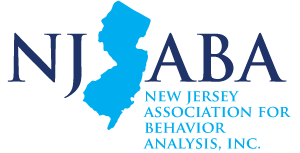MISSION
The NJABA Diversity and Inclusion Workgroup is dedicated to promoting inclusivity within the NJABA organization and our profession regardless of one’s race, ethnicity, sexual orientation, gender identity, age, country of origin, religious or spiritual beliefs, ability, and social and economic class. We value the diverse group of people that makes up our membership, the clients we serve, and our mentees/supervisees and believe that by listening to more voices, we become more well-rounded behavior analysts. We provide support to our members and strive to be a resource to our members and organization through the following activities:
- Promoting diversity within NJABA, including in presentation topics, speakers, and leadership positions
- Educating our membership on issues related to diversity and inclusion
- Providing resources to our membership working with clients and supervisees from diverse backgrounds
- Coordinating volunteers to provide outreach to communities that are typically underserved
- Furthering the NJABA Mission of disseminating the practice of ABA and serving as a resource for behavior analysts, who come from and service people with diverse backgrounds
Leadership Committee
May Beaubrun, M.Ed., LBA, BCBA, Chair
2023 – 2024 Meeting Schedule
Upcoming Meetings
Thursday, May 1, 2025, 5-6pm via Zoom
Workgroup meetings will be held via Zoom unless otherwise noted. The Zoom link is sent to workgroup members a few days prior to each meeting.
Interested, but unsure if you’d like to officially join? Come to a meeting to learn more and network with colleagues. All are welcome! For general inquiries, email info@njaba.org or 609-910-0394.
Insurance, Medicaid & Business Practices
FREQUENTLY ASKED QUESTIONS
FAQ
When with a client with a culture/background different from my own, are there questions I can ask to learn more about their unique culture/background during the intake process or as part of treatment?
10 Questions to Ask a Client with a Diverse Cultural Background
https://counseling.online.wfu.edu/blog/10-diversity-questions-counselors-ask/
Cultural competence refers to the ability to understand, communicate with and effectively interact with people across culture (i.e., race, ethnicity, nationality, gender, status, age, religion, etc.). It is essential to practice cultural responsiveness to increase client outcomes and ensure that treatment outcomes are socially significant. Asking the right questions may help you learn more about the family and their values to better design and implement treatment while building a healthy client ABA provider relationship. Here is a question to consider.
How could you proceed if a client is adamant about using an unproven therapy?
Maintaining Professional Relationships in an Interdisciplinary Setting: Strategies for Navigating Nonbehavioral Treatment Recommendations for Individuals with Autism (BAP 2015)
Matthew T. Brodhead
What resources are available to support school teams to focus on cultural responsiveness?
Culturally Responsive Tiered Fidelity Inventory
Should I receive additional training and/or support when working with a client who’s culture is different from any client that I have worked with?
Assessment of Culturally Sensitive Practice in Behavior Analysis
Fong E. H. (2020). Examining Cross-Cultural Supervision in Applied Behavior Analysis. In B. M. Conners & S. T. Capell (Eds.), Multiculturalism and Diversity Issues in Applied Behavior Analysis. Routledge. https://doi.org/10.4324/9780429263873-15
What is a resource to use when working with a dual language learner?
Each carrier may have specified the credentials of various provider types that may implement behavior-analytic services. Most carriers require a program to be overseen by a Board Certified Behavior Analyst (BCBA-D/BCBA) or a Qualified Health Care Professional (QHCP); while the QHCP does not necessarily specify certification that a BCBA possesses, most carriers will specify the BCBA-D/BCBA certification to fulfill that role. It is recommended that providers discuss specific requirements with each individual carrier under which they may be providing services. Similarly, carriers may have different requirements for individuals who are performing direct therapy under the supervision of the BCBA. Common titles for these individuals may be “therapist,” “tutor,” “paraprofessional,” or Registered Behavior Technician (RBT). It is recommended that providers discuss specific requirements with each individual carrier under which they may be providing services.
What is a resource to facilitate culturally responsive supervision practices?
Supervision Cultural Competency
Beaulieu, Lauren & Addington, Joshua & Almeida, Daniel. (2018). Behavior Analysts’ Training and Practices Regarding Cultural Diversity: the Case for Culturally Competent Care. Behavior Analysis in Practice. 12. 10.1007/s40617-018-00313-6.
What is a resource to use when implementing culturally responsive behavior management in a classroom?
Culturally Responsive Tiered Fidelity Inventory
https://www.pps.net/cms/lib/OR01913224/Centricity/Domain/44/TFI%20CR%202.1.7.pdf

